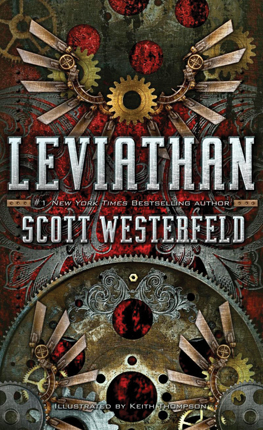Full Text Reviews: Booklist - 08/01/2009 Instead of the Victorian era most often found in the steampunk genre, Westerfeld sets his new series in a Europe hovering on the edge of World War I. The ingenious premise is that Europe is divided not only into traditional historical camps, but also into Darwinists, who genetically manipulate animal “life-strands” into beasts and even whole self-contained ecosystems with wondrous capabilities, and Clankers, whose imposing constructions of metal and gears are a marvel of technological wizardry. Deryn Sharp, from Darwinist England, disguises herself as a boy to enlist on the Leviathan, a flying whale-ship, while Prince Alek, recently orphaned son of Archduke Ferdinand, finds himself on the run in a sort of walking Clanker tank. The plot is boosted almost entirely by exciting and sometimes violent fight sequences, but reading about (and seeing, thanks to Thompson’s ample, lavish, and essential illustrations) the wildly imaginative creatures and machines provides nearly as much drive. Fans of Philip Reeve’s Mortal Engines (2003) or Kenneth Oppel’s Airborn (2004) will be right at home in Westerfeld’s alternate reality. - Copyright 2009 Booklist. School Library Journal - 09/01/2009 Gr 7 Up— This is World War I as never seen before. The story begins the same: on June 28, 1914, Archduke Franz Ferdinand and his wife are assassinated, triggering a sequence of alliances that plunges the world into war. But that is where the similarity ends. This global conflict is between the Clankers, who put their faith in machines, and the Darwinists, whose technology is based on the development of new species. After the assassination of his parents, Prince Aleksandar's people turn on him. Accompanied by a small group of loyal servants, the young Clanker flees Austria in a Cyklop Stormwalker, a war machine that walks on two legs. Meanwhile, as Deryn Sharp trains to be an airman with the British Air Service, she prays that no one will discover that she is a girl. She serves on the Leviathan , a massive biological airship that resembles an enormous flying whale and functions as a self-contained ecosystem. When it crashes in Switzerland, the two teens cross paths, and suddenly the line between enemy and ally is no longer clearly defined. The ending leaves plenty of room for a sequel, and that's a good thing because readers will be begging for more. Enhanced by Thompson's intricate black-and-white illustrations, Westerfeld's brilliantly constructed imaginary world will capture readers from the first page. Full of nonstop action, this steampunk adventure is sure to become a classic.—Heather M. Campbell, formerly at Philip S. Miller Library, Castle Rock, CO - Copyright 2009 Publishers Weekly, Library Journal and/or School Library Journal used with permission. Bulletin for the Center... - 12/01/2009 In this rousing alternate history of World War I, the assassinated Archduke Ferdinand leaves a legal heir, a sixteen-year-old son, Alek, who’s forced into hiding both from the German allies who press for European war and his own countrymen who oppose his succession. Alek and several loyal retainers flee in the latest “Clanker” technology, kerosene-driven behemoths that stride across the landscape on mechanical legs. While Alek dodges his enemies, Deryn Sharp has passed herself off as a boy (named Dylan) and enlisted in the British Air Service, where s/he’s been informally assigned (through a spectacular aerial accident) to the airship Leviathan; the vessel is a state-of-the-art craft of “Darwinian” design, an airborne ecosystem based on hybridized animals and hydrogen power. Leviathan is attacked and crashes in the Swiss Alps, near the derelict but well-supplied castle in which Alek and his entourage take refuge. With German land and air forces rallying for attack, the two would-be enemies are forced to cooperate in order to save their skins. This is a slice of heaven for steampunk fans, with fabulously detailed rival technologies and plenty of action. Some prior background on World War I enhances the interest, but readers who haven’t gotten to (or have snoozed through) that unit won’t much feel the loss. Westerfeld leaves his audience dangling, with promise of a tricky diplomatic mission to Constantinople in view. The request line for the sequel can start forming now. EB - Copyright 2009 The Board of Trustees of the University of Illinois. Loading...
|



